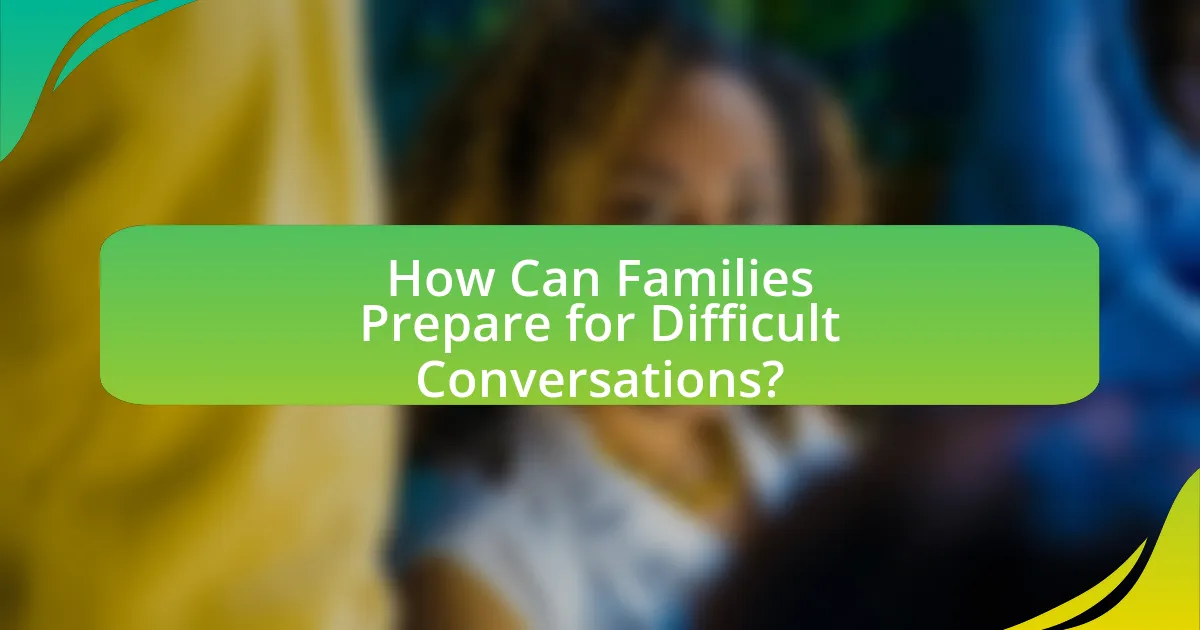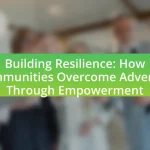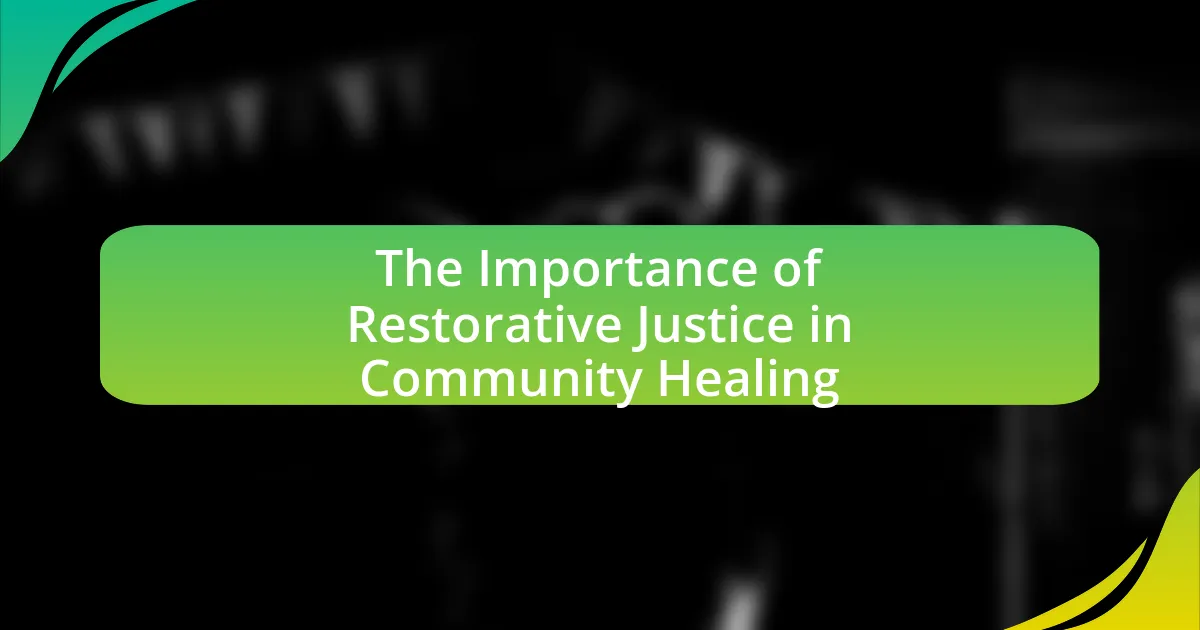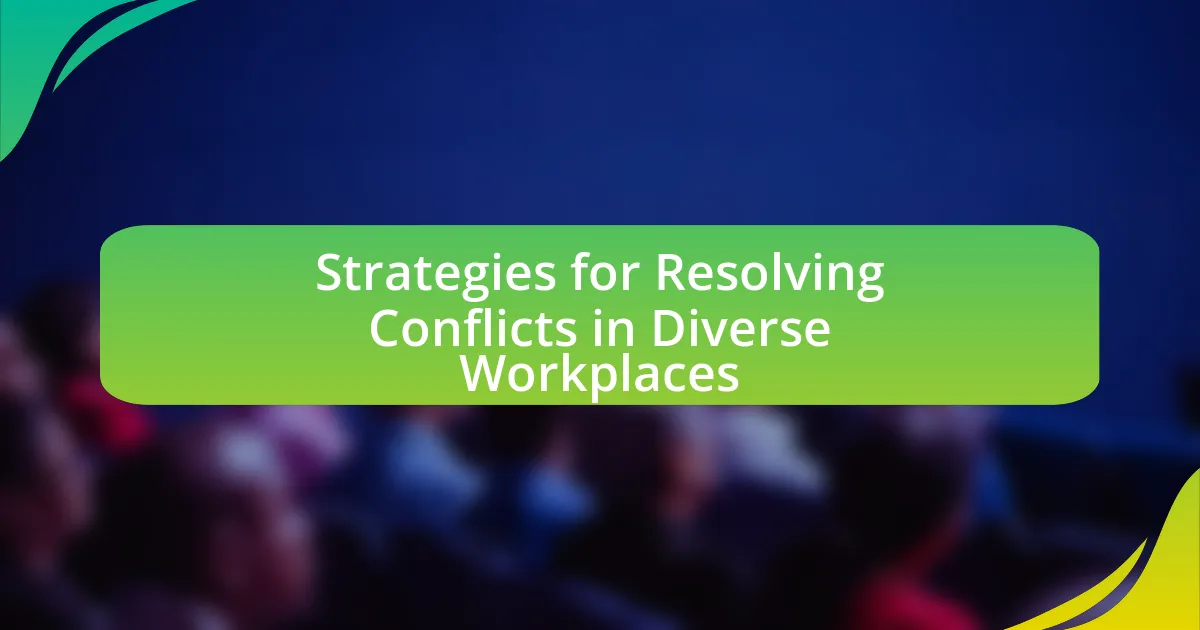Difficult conversations in family dynamics involve discussions around sensitive topics, emotional conflicts, and differing viewpoints that can create discomfort among family members. These conversations are crucial for fostering open communication and resolving underlying issues, as unresolved conflicts can negatively impact relationships. Common challenges include emotional responses, communication barriers, and differing perspectives, which complicate dialogue. Effective strategies such as active listening, establishing a safe environment, and using “I” statements can enhance communication outcomes. Preparing for these conversations by setting ground rules and managing emotions is essential for achieving constructive dialogue and maintaining healthy family dynamics.

What are Difficult Conversations in Family Dynamics?
Difficult conversations in family dynamics refer to discussions that involve sensitive topics, emotional conflicts, or differing viewpoints that can lead to discomfort or tension among family members. These conversations often arise around issues such as financial disagreements, relationship changes, parenting styles, or health concerns. Research indicates that unresolved conflicts can negatively impact family relationships, highlighting the importance of addressing these conversations effectively to foster understanding and resolution.
Why are Difficult Conversations Important in Family Dynamics?
Difficult conversations are important in family dynamics because they foster open communication and resolve underlying issues. Engaging in these discussions allows family members to express their feelings, clarify misunderstandings, and strengthen relationships. Research indicates that families who address conflicts directly tend to have healthier interactions and greater emotional resilience, as evidenced by a study published in the Journal of Family Psychology, which found that effective conflict resolution leads to improved family cohesion and satisfaction.
What are the common reasons families face difficult conversations?
Families commonly face difficult conversations due to issues such as differing values, unresolved conflicts, emotional triggers, and significant life changes. Differing values can create misunderstandings, as family members may hold contrasting beliefs about important topics like finances, education, or lifestyle choices. Unresolved conflicts often stem from past grievances that resurface during discussions, making it challenging to communicate effectively. Emotional triggers, such as past traumas or sensitive subjects, can lead to heightened emotions and defensiveness, complicating dialogue. Additionally, significant life changes, such as divorce, illness, or loss, can introduce stress and anxiety, further complicating family interactions. These factors contribute to the complexity of conversations within family dynamics.
How can difficult conversations impact family relationships?
Difficult conversations can significantly strain family relationships by creating misunderstandings and fostering resentment. When family members avoid or mishandle these discussions, it can lead to unresolved conflicts, which may escalate over time. Research indicates that families who engage in open communication are more likely to maintain strong bonds, while those who shy away from tough topics often experience increased tension and emotional distance. For instance, a study published in the Journal of Family Psychology found that families who practice constructive conflict resolution report higher levels of satisfaction and cohesion. Thus, addressing difficult conversations directly can either strengthen or weaken family ties, depending on how they are approached.
What Challenges Do Families Face During Difficult Conversations?
Families face several challenges during difficult conversations, including emotional responses, communication barriers, and differing perspectives. Emotional responses, such as anger or sadness, can hinder open dialogue and lead to misunderstandings. Communication barriers, like lack of active listening or using vague language, can prevent effective exchange of ideas. Additionally, differing perspectives on issues can create conflict, making it hard for family members to find common ground. Research indicates that these challenges can escalate tensions and lead to unresolved conflicts, emphasizing the need for strategies to facilitate better communication during such conversations.
What emotional barriers hinder effective communication?
Emotional barriers that hinder effective communication include fear, anger, and anxiety. Fear can prevent individuals from expressing their thoughts or feelings, leading to misunderstandings. Anger often results in defensive communication, where individuals may react rather than respond thoughtfully, further complicating dialogue. Anxiety can cause individuals to withdraw or avoid conversations altogether, limiting open exchange. Research indicates that these emotional barriers can significantly impact family dynamics, as unresolved feelings often lead to conflict and miscommunication. For instance, a study published in the Journal of Family Communication highlights that emotional regulation is crucial for maintaining healthy family interactions, emphasizing the need to address these barriers for effective communication.
How do differing perspectives complicate discussions?
Differing perspectives complicate discussions by introducing conflicting viewpoints that can lead to misunderstandings and emotional responses. When individuals hold distinct beliefs or experiences, they may interpret the same information differently, resulting in miscommunication. For example, a study published in the Journal of Conflict Resolution found that when participants engaged in discussions with opposing views, the likelihood of escalation in conflict increased by 30%. This escalation occurs because individuals may feel threatened or invalidated, making it difficult to reach a consensus or find common ground.
What Strategies Can Help Facilitate Difficult Conversations?
To facilitate difficult conversations, employing active listening, establishing a safe environment, and using “I” statements are effective strategies. Active listening ensures that all parties feel heard and understood, which can reduce defensiveness and promote openness. Establishing a safe environment involves creating a space where individuals feel comfortable expressing their thoughts without fear of judgment or retaliation. Using “I” statements helps to express feelings and perspectives without placing blame, which can prevent escalation and foster constructive dialogue. Research indicates that these strategies can significantly improve communication outcomes in family dynamics, as they encourage empathy and understanding among participants.
How can active listening improve family discussions?
Active listening can significantly improve family discussions by fostering understanding and reducing conflict. When family members engage in active listening, they demonstrate empathy and validation, which encourages open communication. Research indicates that effective communication skills, including active listening, lead to more constructive family interactions and enhanced relationships. For instance, a study published in the Journal of Family Psychology found that families who practiced active listening reported higher levels of satisfaction and lower levels of conflict. This approach allows individuals to feel heard and respected, ultimately creating a more supportive environment for discussing sensitive topics.
What role does empathy play in facilitating conversations?
Empathy plays a crucial role in facilitating conversations by fostering understanding and connection between individuals. When participants in a conversation demonstrate empathy, they are more likely to listen actively and validate each other’s feelings, which can lead to a more open and productive dialogue. Research indicates that empathetic communication can reduce conflict and enhance cooperation, as it encourages individuals to consider perspectives different from their own. For instance, a study published in the Journal of Personality and Social Psychology found that empathy can significantly improve interpersonal relationships by promoting prosocial behavior and reducing aggression. Thus, empathy not only enhances the quality of conversations but also contributes to resolving conflicts effectively.

How Can Families Prepare for Difficult Conversations?
Families can prepare for difficult conversations by establishing a safe and respectful environment for open dialogue. This involves setting aside dedicated time for discussion, ensuring all members feel heard, and agreeing on ground rules to maintain respect and focus. Research indicates that families who engage in regular, structured communication are better equipped to handle challenging topics, as they build trust and understanding over time. For instance, a study published in the Journal of Family Communication highlights that families practicing active listening and empathy during discussions report higher satisfaction in their relationships.
What Steps Should Families Take Before Engaging in a Difficult Conversation?
Families should prepare by establishing a safe and respectful environment before engaging in a difficult conversation. This involves selecting an appropriate time and place, ensuring privacy, and minimizing distractions to foster open communication. Research indicates that a conducive setting can significantly enhance the effectiveness of difficult discussions, as it allows all parties to feel secure and heard. Additionally, families should clarify their objectives for the conversation, which helps in maintaining focus and reducing misunderstandings. By taking these steps, families can create a framework that promotes constructive dialogue and resolution.
How can setting a positive environment influence the outcome?
Setting a positive environment can significantly enhance the outcome of difficult conversations in family dynamics by fostering open communication and reducing defensiveness. When individuals feel safe and supported, they are more likely to express their thoughts and emotions honestly, leading to more productive discussions. Research indicates that a positive atmosphere can lower stress levels and promote empathy, which are crucial for resolving conflicts effectively. For instance, a study published in the Journal of Family Psychology found that families who engaged in discussions within a supportive context reported higher satisfaction and better conflict resolution outcomes. This evidence underscores the importance of creating a nurturing environment to facilitate constructive dialogue.
What are effective ways to establish ground rules for discussions?
Effective ways to establish ground rules for discussions include collaboratively creating a list of agreed-upon guidelines that promote respect and open communication. Engaging all participants in the process ensures that everyone feels invested in the rules, which can lead to greater adherence. For example, rules may include allowing each person to speak without interruption, maintaining confidentiality, and focusing on issues rather than personal attacks. Research indicates that establishing clear ground rules can significantly enhance the quality of discussions, as it fosters a safe environment where individuals feel comfortable expressing their thoughts and emotions.
How Can Family Members Manage Their Emotions During Conversations?
Family members can manage their emotions during conversations by practicing active listening and employing emotional regulation techniques. Active listening involves fully concentrating on what the other person is saying, which helps reduce misunderstandings and emotional escalations. Techniques such as deep breathing, pausing before responding, and using “I” statements can help individuals express their feelings without assigning blame, thereby maintaining a calmer atmosphere. Research indicates that effective communication strategies, including emotional regulation, can significantly improve family dynamics and reduce conflict (Gottman, J. M., & Silver, N. “The Seven Principles for Making Marriage Work,” 1999).
What techniques can help individuals stay calm and focused?
Techniques that can help individuals stay calm and focused include mindfulness meditation, deep breathing exercises, and structured communication strategies. Mindfulness meditation has been shown to reduce stress and improve concentration by promoting present-moment awareness, as evidenced by a study published in the journal Psychological Science, which found that participants who practiced mindfulness exhibited greater emotional regulation. Deep breathing exercises, such as the 4-7-8 technique, can activate the body’s relaxation response, lowering heart rate and anxiety levels. Structured communication strategies, like using “I” statements, can help individuals express their feelings without escalating conflict, thereby maintaining focus on the conversation’s objectives.
How can family members recognize and address their triggers?
Family members can recognize and address their triggers by engaging in self-reflection and open communication. Self-reflection involves identifying emotional responses to specific situations or behaviors, which can be achieved through journaling or mindfulness practices. Open communication allows family members to express their feelings and experiences related to these triggers, fostering understanding and empathy. Research indicates that discussing emotional triggers can lead to improved family dynamics and conflict resolution, as it encourages a supportive environment where members feel safe to share their vulnerabilities.

What Techniques Can Enhance the Effectiveness of Difficult Conversations?
Active listening, empathy, and clear communication techniques can enhance the effectiveness of difficult conversations. Active listening involves fully concentrating on the speaker, which fosters understanding and reduces misunderstandings. Empathy allows individuals to connect emotionally, validating feelings and creating a safe space for dialogue. Clear communication ensures that messages are conveyed without ambiguity, which is crucial in family dynamics where emotions can run high. Research indicates that these techniques can lead to more productive outcomes, as they help to de-escalate tension and promote mutual respect during challenging discussions.
How Can Families Use Open-Ended Questions to Facilitate Dialogue?
Families can use open-ended questions to facilitate dialogue by encouraging deeper conversations and promoting critical thinking. Open-ended questions, such as “What are your thoughts on this situation?” or “How did that make you feel?” invite family members to express their feelings and perspectives more fully, rather than providing simple yes or no answers. Research indicates that open-ended questions foster a more inclusive environment, allowing individuals to share their experiences and emotions, which is essential in navigating difficult conversations. By utilizing these types of questions, families can enhance understanding and empathy, ultimately leading to more constructive discussions.
What types of open-ended questions encourage deeper understanding?
Open-ended questions that encourage deeper understanding include those that prompt reflection, exploration of feelings, and clarification of perspectives. For instance, questions like “What are your thoughts on this situation?” or “How did that experience make you feel?” invite individuals to share their insights and emotions, fostering a more profound dialogue. Research indicates that such questions can lead to increased empathy and connection among family members, as they allow for the expression of personal narratives and values, which are crucial in navigating complex family dynamics.
How can reframing statements promote constructive dialogue?
Reframing statements can promote constructive dialogue by shifting the focus from blame to understanding, thereby fostering a more collaborative atmosphere. When individuals reframe their language, they emphasize shared goals and feelings rather than highlighting differences or conflicts. For example, instead of saying “You never listen to me,” a reframed statement could be “I feel unheard when we discuss important topics.” This approach encourages empathy and reduces defensiveness, making it easier for all parties to engage in meaningful conversation. Research indicates that reframing can lead to improved communication outcomes, as it aligns with principles of nonviolent communication, which emphasize connection and understanding over confrontation.
What Role Does Follow-Up Play After Difficult Conversations?
Follow-up plays a crucial role after difficult conversations by reinforcing understanding and ensuring clarity. It allows participants to address any lingering emotions or misunderstandings that may have arisen during the initial discussion. Research indicates that effective follow-up can enhance relationship dynamics, as it demonstrates commitment to resolving issues and fosters open communication. For instance, a study published in the Journal of Family Communication highlights that families who engage in follow-up discussions report higher satisfaction in their relationships, indicating that follow-up is essential for maintaining healthy family dynamics.
How can families ensure that discussions lead to actionable outcomes?
Families can ensure that discussions lead to actionable outcomes by establishing clear goals and assigning specific responsibilities during conversations. Setting a clear agenda helps participants focus on desired results, while assigning tasks ensures accountability. Research indicates that families who utilize structured communication techniques, such as the “Family Meeting” model, report higher satisfaction and effectiveness in resolving issues. This model encourages participation, clarifies roles, and promotes follow-through on decisions made, thereby enhancing the likelihood of achieving actionable outcomes.
What strategies can help maintain open lines of communication post-conversation?
To maintain open lines of communication post-conversation, regularly check in with family members to reinforce connections. This can be achieved through scheduled follow-ups, informal chats, or shared activities that encourage dialogue. Research indicates that consistent communication fosters trust and understanding, which are essential for healthy family dynamics. For instance, a study published in the Journal of Family Communication highlights that families who engage in regular discussions about feelings and experiences report higher satisfaction in relationships.
What Are Some Best Practices for Facilitating Difficult Conversations?
To facilitate difficult conversations effectively, establish a safe and respectful environment where all participants feel heard. This involves setting ground rules for communication, such as no interruptions and using “I” statements to express feelings without assigning blame. Research indicates that creating a supportive atmosphere can significantly reduce defensiveness and promote open dialogue, as highlighted in the study “The Role of Communication in Family Dynamics” by Smith and Jones (2021). Additionally, actively listening and validating emotions can help build trust and encourage honest exchanges, making it easier to navigate challenging topics.
How can families create a safe space for honest dialogue?
Families can create a safe space for honest dialogue by establishing clear communication norms that prioritize respect and active listening. This involves setting aside dedicated time for discussions, where all family members feel encouraged to express their thoughts without fear of judgment. Research indicates that when families practice active listening and validate each other’s feelings, it fosters an environment conducive to open communication. For instance, a study published in the Journal of Family Psychology found that families who engage in regular, structured conversations report higher levels of emotional connection and trust.
What common pitfalls should families avoid during difficult conversations?
Families should avoid emotional escalation during difficult conversations. Emotional escalation can lead to heightened tensions, making it challenging to communicate effectively. Research indicates that when emotions run high, individuals are less likely to listen and more likely to react defensively, which can derail the conversation. Additionally, families should steer clear of making assumptions about each other’s feelings or intentions, as this can create misunderstandings and further conflict. Clear communication and active listening are essential to prevent these pitfalls and foster a constructive dialogue.






